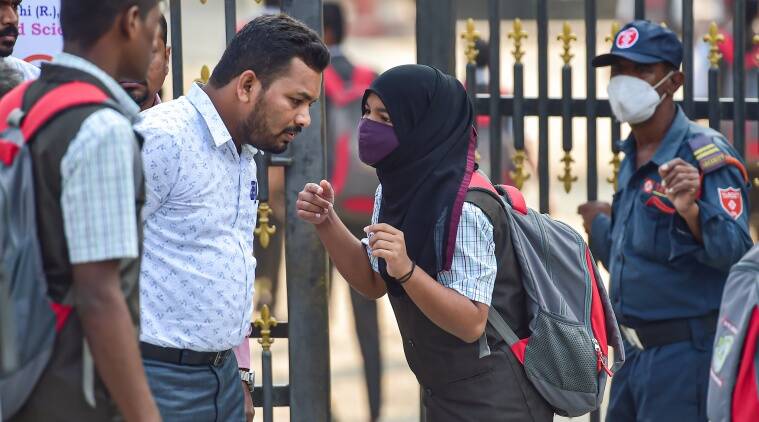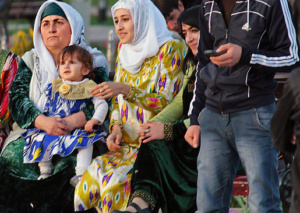Karnataka, MINA – An Indian court has upheld a ban on the hijab in class in the southern state of Karnataka, governed by Prime Minister Narendra Modi’s Bharatiya Janata Party (BJP).
“We are of the considered opinion that wearing of hijab by Muslim women does not form a part of essential religious practice,” Chief Justice Ritu Raj Awasthi of the Karnataka High Court said in a judgement on Tuesday as quoted from Al Jazeera.
He said the government had the power to prescribe uniform guidelines, dismissing various petitions challenging the order.
Students who had challenged the ban in court had said wearing the hijab was a fundamental right guaranteed under India’s constitution and an essential practice of Islam.
Also Read: The Forty-Four-Days of Glory: Azerbaijan’s Struggle for Justice and Peace
Lawyer Anas Tanwir, who said he will represent the girls now planning to move the Supreme Court, called the Karnataka court’s ruling “disappointing” and “erroneous”.
“I believe it is a wrong interpretation of the law,” he told Al Jazeera.
“As far as essential religious practice is concerned, [that] should not have been the question. The question should have been whether the [authorities] had the power to pass such orders.”
Tuesday’s ruling could set a precedent for the rest of the country, home to more than 200 million Muslims who make up about 14 percent of India’s 1.35 billion population.
Also Read: Palestine Solidarity Month: A Collective Movement for Al-Aqsa and Palestine’s Freedom
Currently, there is no central law or rule on school uniforms across the country, but the Karnataka ruling could prompt more states to issue such guidelines.
Verdict ‘judicially sanctions apartheid’
Afreen Fatima, student activist with Fraternity Movement, a Muslim group, said the court’s verdict is “very disturbing”.
“It judicially sanctions apartheid. It is going to set a worrying precedent and further push Muslim women out of educational spaces. Its implications are are going to be felt across all states. It will embolden the Hindu extremists to demean Muslim women in public spaces,” she said.
Also Read: Hassan al-Turabi: A Controversial Thinker from Sudan
Karnataka’s hijab dispute began in January when a government-run school in the state’s Udupi district barred students wearing hijabs from entering classrooms, triggering protests by Muslims and counter-protests by Hindu students.
More schools and colleges in the state followed with similar bans and the state’s top court disallowed students from wearing the hijab until it delivered a verdict.
In India, the hijab has historically been neither banned nor limited in public spheres.
Many in Karnataka say Muslim girls have worn the hijab in schools and colleges for decades, just as Hindus, Sikhs and Christians have done with symbols of their respective symbols.
Also Read: Who Exactly is the RSF Group Shaking Sudan?
Syed Sarfraz, the Karnataka state secretary of the Campus Front of India, a Muslim students’ group, said the court’s decision was “unconstitutional”.
The legal fight against the hijab ban will continue,” he said.
“We are shocked by the court declaring that hijab is not an essential Islamic practice. This is not for them to decide. The hijab has a clear mandate in Quran.”
The hijab dispute has led to criticism that India’s Muslims are being further marginalised.
Also Read: The Two-State Solution (Palestine–Israel) in Historical Perspective
Ahead of the verdict, Karnataka authorities announced closures of schools and colleges, and imposed resSSSaSatrictions on public gatherings in some parts of the state to prevent potential trouble.
Last month, federal Home Minister Amit Shah said he preferred students sticking to school uniforms instead of any religious attire.
Karnataka’s ban had led to protests in some other parts of the country too and drew criticism from the United States and the Organisation of Islamic Cooperation.
At Karnataka’s Kundapura town in Udupi district, 16-year-old Aysha Nourin, a student of RN Shetty PU College, said the court verdict is “Lo acceptable” to her and that she will not compromise on “our hijab”.
Also Read: Enchanted by K-Dramas, Dragged into Slander: Time for Muslims to Rise!
“For more than a month, I and around 50 other girls from my college have not attended classes, and some have missed examinations,” she said.
“What we want to wear should be our decision. They cannot decide what we should wear or not wear,” she added. (T/RE1)
Mi’raj News Agency (MINA)
Also Read: Creating Opportunity and Avoiding Misery; Lesson Learn on Waste Recycling Issue












![Israeli tanks and APC’s gather by the Israeli – Lebanese border. Amid Israel’s escalating campaign against Hezbollah in Lebanon on September 30, 2024. [Erik Marmor/Getty Images]](https://en.minanews.net/wp-content/uploads/2024/10/IMG_20241001_203226-300x197.jpg)
























 Mina Indonesia
Mina Indonesia Mina Arabic
Mina Arabic